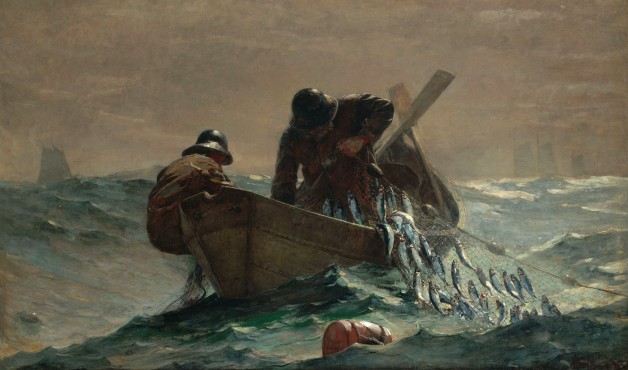Why nets?
Over and over again they appear: now Peter and Andrew cast them into the sea; now Jesus orders they be cast again; now they tear; now they don’t; now they threaten shipwreck; now they need mending.
Fish may fill the nets, but nets fill the gospels.
Why?
There’s little exciting, or sublime, or beautiful about a net. No one catches their breath, grabs the arm of their nearest friend, points urgently and says, “My God, just look at that gorgeous net!” Nets are grimy, slimy, ordinary things, utterly resistant to romanticizing. Name one action hero who uses a net. Sifting strands of seaweed and fumbling with fraying cords isn’t exactly the stuff of legend. So why make nets the apostles’ primary tool?
Or maybe all of that is exactly why.
Fishing for men isn’t about theatrics. It’s not about spectacle or rhetoric or grandstanding. It’s also not about counting your catch. No, like nets, it’s mostly unimpressive, gritty, and regular. True evangelization is simply about meeting people, loving them, and bringing them to Jesus. It’s about ordinary and everyday charity. Patience with someone aggravating, a smile and a warm greeting for someone ignored, an offer of help to someone overwhelmed—these are the ropes that form the net of God’s love.
But if love is how God wants us to draw men toward him, then we need to be realistic about the nets we cast: God’s love is steadfast and strong, but ours often isn’t. Our love gets dirty, unwinds, and even tears. Sin clings to us like seaweed and the edges of our virtues fray. That means that our love—like the apostles’ nets—calls for careful attention and constant mending. We must constantly return to Christ, who is something of a divine weaver, and ask him to mend our love through his sacraments.
When we do this, when we acknowledge our faults, order our ordinary actions towards others, and consent to being cast wherever Christ chooses, something will transform in our lives. Not only will the nets of our own love grow stronger, but we ourselves will also become cords of charity in the net of divine love. Then, perhaps, someone will say of us what Bl. Jordan once said of St. Dominic:
He caught up everyone in the bountiful net of his charity.
✠
Image: Winslow Homer, The Herring Net







